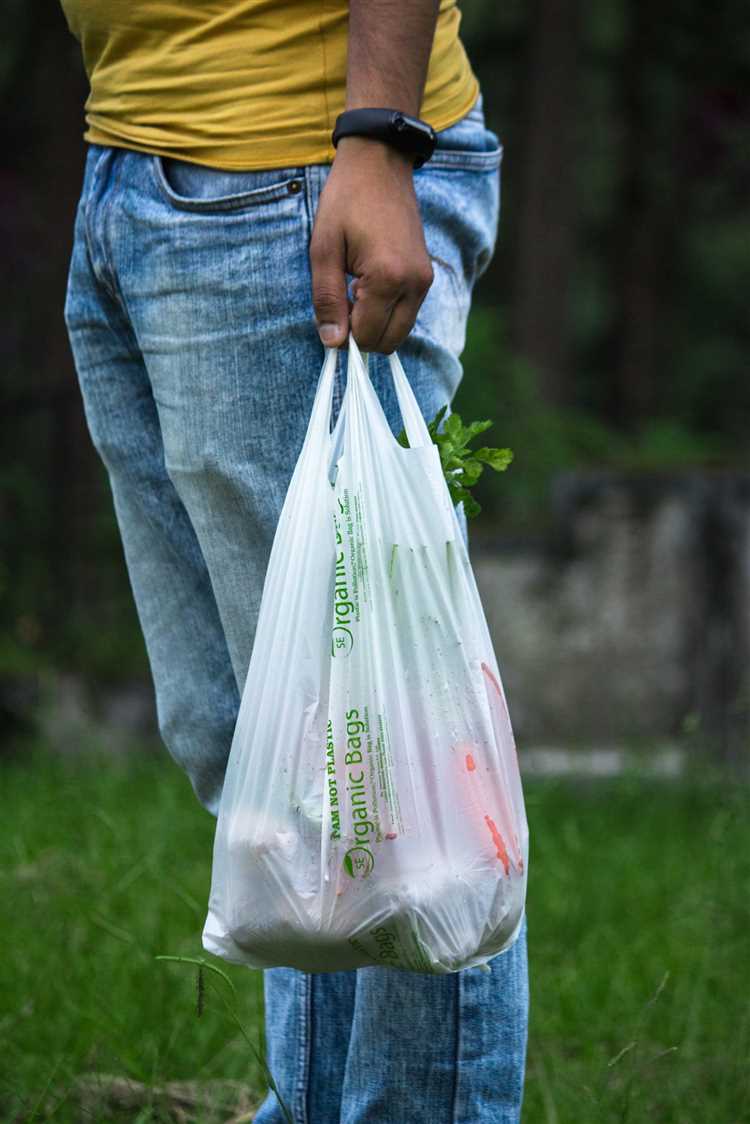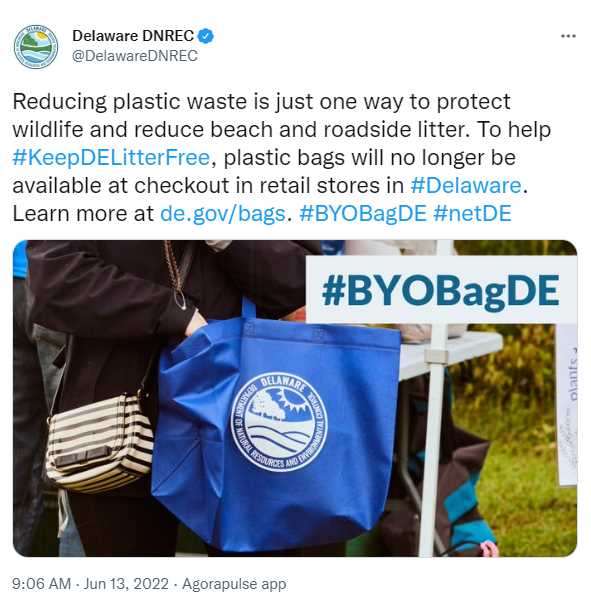Delaware, like many other states, has implemented a ban on single-use plastic bags in an effort to reduce waste and protect the environment. However, there are exceptions to this ban that you need to be aware of.
One of the major exceptions to the ban is for small businesses with less than 10 employees. These businesses will still be allowed to provide plastic bags to their customers. This exception was implemented to prevent undue financial burden on smaller establishments that may struggle to find affordable and sustainable alternatives.
Anotheexcepr exception applies to plastic bags used for certain products. Specifically, plastic bags can still be used for bulk items, such as fruits, vegetables, nuts, and grains. These bags are typically thinner and lightweight, and allow for easier storage and handling of loose items.
Additionally, there is an exception for waste management and recycling purposes. Plastic bags that are necessary for the proper disposal and transportation of recyclable materials, such as bottles and cans, can still be provided by retailers or used by consumers.
It is important to note that even with these exceptions, the overall goal of the ban is to encourage consumers and businesses to adopt more sustainable practices. Reusable bags made from materials like cloth or canvas are a great alternative to plastic bags, as they are durable and can be used multiple times.
In conclusion, while Delaware has implemented a ban on single-use plastic bags, there are exceptions in place to accommodate small businesses, certain products, and waste management needs. Nevertheless, it is crucial for all of us to embrace more sustainable alternatives and reduce our reliance on plastic in order to protect our environment for future generations.
- Overview of Delaware’s Plastic Bag Ban
- Scope of the Ban
- Exceptions for Certain Businesses
- Exemptions for Certain Types of Bags
- Q&A
- Which state has implemented a plastic bag ban?
- What is the exception to the plastic bag ban in Delaware?
- Why are bags used to package raw meat, poultry, or fish exempt from the plastic bag ban?
- What are the alternatives to plastic bags for packaging raw meat, poultry, or fish?
Overview of Delaware’s Plastic Bag Ban

Delaware passed a law in 2019 banning plastic bags in an effort to reduce single-use plastic waste and promote more sustainable practices. The ban went into effect on January 1, 2021, making Delaware the ninth state in the United States to implement such a ban.
Under the ban, retailers are prohibited from providing customers with single-use plastic bags at the point of sale. This includes grocery stores, convenience stores, and other retail establishments. Instead, customers are encouraged to bring their own reusable bags or purchase paper or cloth bags at a minimal cost.
The ban does not apply to certain types of plastic bags, including those used for bulk items such as fruits, vegetables, nuts, grains, or candy; bags used for prescription medications; and bags used for food safety or to prevent contamination. These exceptions were made to accommodate the unique needs of certain industries and ensure that public health and safety are not compromised.
In addition to the ban on plastic bags, Delaware has also taken measures to reduce the use of other single-use plastics. For example, plastic straws are only provided upon request, and certain businesses have voluntarily eliminated the use of single-use plastic utensils and cups.
| Effective Date | January 1, 2021 |
|---|---|
| Types of Bags Covered | Single-use plastic bags |
| Exceptions | – Bags used for bulk items |
| – Bags used for prescription medications | |
| – Bags used for food safety or to prevent contamination | |
| Alternative Options | Reusable bags, paper bags, cloth bags |
| Additional Measures | Reduced use of plastic straws, single-use plastic utensils, and cups |
Since the implementation of the plastic bag ban, Delaware has seen a significant reduction in the amount of plastic waste generated by single-use bags. This has led to a cleaner and more environmentally-friendly state, benefiting both residents and wildlife.
While the ban has been successful in reducing plastic bag waste, it is important for consumers and businesses to continue making conscious efforts to reduce their overall use of plastic and adopt more sustainable alternatives. By working together, Delaware can continue to make progress in its efforts to create a greener and more sustainable future.
Scope of the Ban
The plastic bag ban in Delaware applies to all retail establishments, including grocery stores, convenience stores, pharmacies, and even restaurants. This means that these businesses are no longer allowed to provide single-use plastic bags to customers.
However, there are some exceptions to the ban. Certain types of plastic bags are still permitted, such as those used for packaging loose bulk items like fruits or vegetables, or for containing raw meat or fish to prevent contamination. Additionally, plastic bags used for prescription medications or newspapers are exempt from the ban.
Furthermore, the ban does not apply to plastic bags provided by the customer themselves, such as reusable bags or plastic bags brought from home. Customers are encouraged to bring their own bags to help reduce waste and promote sustainability.
If a business violates the ban and continues to provide single-use plastic bags, they may face penalties, including fines and potential loss of business licenses. It is important for both businesses and consumers to be aware of these restrictions and to comply with the ban in order to protect the environment and reduce plastic waste.
Exceptions for Certain Businesses
While the plastic bag ban applies to most businesses in Delaware, there are some exceptions for certain types of businesses. These exceptions are in place to ensure the continued operation of necessary services and to minimize any negative impact on these businesses. The following businesses are exempt from the plastic bag ban:
Pharmacies: Pharmacies are permitted to provide plastic bags to customers for the safe and hygienic transport of prescription medications and other pharmaceutical products.
Restaurants and Foodservice Providers: Restaurants and foodservice providers are allowed to use plastic bags for take-out and delivery orders, as well as for packaging and storing food items to maintain their quality and prevent contamination.
Charitable Organizations: Charitable organizations can still use plastic bags for collecting donations and distributing goods to those in need. This exception is in recognition of the vital role that these organizations play in supporting the community.
Retailers of Perishable Food: Retailers that primarily sell perishable food items, such as meat, seafood, and produce, are exempt from the plastic bag ban. This exemption ensures that these businesses can safely package and transport these items to customers without compromising their freshness and quality.
Medical Facilities: Medical facilities, including hospitals and clinics, are exempt from the plastic bag ban. This exception is necessary to ensure the proper disposal of medical waste and to maintain the highest standards of hygiene and safety in these environments.
It is important for these businesses to be aware of the specific requirements and regulations associated with their exemption from the plastic bag ban. They must still comply with other relevant environmental regulations and take steps to minimize their overall plastic waste.
Exemptions for Certain Types of Bags

While Delaware has implemented a statewide ban on single-use plastic bags, there are a few exemptions for certain types of bags that are still allowed. These exemptions have been put in place to accommodate specific needs and to ensure that businesses and individuals are not unduly burdened by the ban.
1. Certain Retail Bags
Retailers are still permitted to provide customers with certain types of bags, including bags used to package loose bulk items such as fruit, vegetables, nuts, grains, and candy. These bags are often necessary to maintain hygiene and prevent cross-contamination. However, it is important for retailers and customers to be mindful of reducing waste and using these bags only when necessary.
2. Bags for Prepared Foods
Bags used to package prepared foods, such as takeout containers, are also exempt from the ban. These bags are commonly used to transport meals and snacks, and eliminating them entirely could lead to an increase in food waste as customers may be less likely to purchase food if they cannot conveniently transport it.
3. Bags for Prescription Medications
Pharmacies and other healthcare providers are allowed to continue providing bags for prescription medications. These bags are essential for maintaining patient privacy and protecting sensitive information. However, it is encouraged for individuals to consider reusing or recycling these bags when possible to reduce waste.
4. Bags for Waste Disposal
Bags used for waste disposal, such as trash bags and recycling bags, are exempt from the ban. These bags play a critical role in maintaining cleanliness and preventing the spread of germs or odors. However, individuals should still be mindful of reducing their overall waste and using these bags efficiently.
While these exemptions allow for certain types of bags to continue to be used, it is important for individuals and businesses to actively seek out alternatives to single-use plastic bags whenever possible. Reusable bags made from materials such as cloth, canvas, or recycled plastics are an eco-friendly alternative that can help reduce waste and lessen environmental impact.
Q&A
Which state has implemented a plastic bag ban?
Delaware has implemented a plastic bag ban.
What is the exception to the plastic bag ban in Delaware?
The exception to the plastic bag ban in Delaware is for bags used to package raw meat, poultry, or fish.
Why are bags used to package raw meat, poultry, or fish exempt from the plastic bag ban?
Bags used to package raw meat, poultry, or fish are exempt from the plastic bag ban in Delaware because they are necessary for food safety reasons. These bags help prevent cross-contamination and protect the consumer from any potential health risks.
What are the alternatives to plastic bags for packaging raw meat, poultry, or fish?
The alternatives to plastic bags for packaging raw meat, poultry, or fish include using paper bags, reusable cloth bags, or compostable bags. These alternatives are more environmentally friendly and still provide the necessary protection for the food.